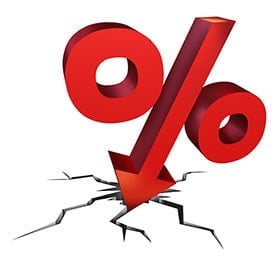by Money Metals
It’s the most widely anticipated recession in history. The recession hasn’t arrived yet – and may not do so anytime soon – but the mainstream media still can’t stop talking about it.
Consider this strange article from NBC News. It purports to show that young adults are posting dark, ironic memes to social media in reaction to a “possible recession looming.” It’s a possible, undated, undefined downturn of unknown severity that millennials are supposedly now coping with in advance!
CNN, meanwhile, sees “signs of a potential looming recession” – more severe in scope, presumably, than the network’s actual viewer ratings recession.
The free-flowing recession talk in the media can create something of a self-fulfilling prophecy.
If consumers and business owners begin to fear an oncoming recession, they may pare back spending and put capital investments on hold – which in turn will cause GDP to weaken.
“The snowball of a recession has begun to roll,” writes former U.S. Senator Judd Gregg (R). “When the mindset of American business shifts from expansion to defensive restructuring, a recession cannot be far behind. It becomes a self-fulfilling event.”
Trump Economy Slows… But Hasn’t Yet Slid
Some key indicators are pointing toward an economic slowdown:
- Despite low official unemployment numbers across the board, jobs growth has slowed to its weakest pace since 2011.
- Despite getting a boost from the Trump tax cuts, corporate earnings growth is now decelerating.
- Copper and other economically sensitive industrial metals are showing relative weakness.
- The Treasury yield curve recently inverted.
- And, likely as a result of trade disputes between the U.S. and China, manufacturing activity has slumped to a multi-year low.
GDP itself its slowing. U.S. gross domestic product in the in the second quarter came in at 2% growth (down from 3% earlier in the year) – its second worst showing since President Donald Trump took office.

Still, it’s not an actual recession. Yet.
If a recession does hit between now and November 2020, President Donald Trump’s chances of getting re-elected will be slim.
That political reality isn’t lost on Democrats. They are practically begging for a recession! Some in the media are trying to engineer one through their propaganda campaigns aimed at manipulating mass psychology.
There is even a possibility that the Federal Reserve will sabotage the economy to hurt President Trump. Former New York Fed President William Dudley is explicitly urging Fed policymakers to withhold economic stimulus as a way of rebuking Trumponomics and tilting the election in favor of his opponent.
The Fed appears to be back in stimulus mode at the moment, however. The question is whether the so far tepid rate-cutting campaign will be enough to extend an already overextended economic expansion (officially the longest in history) through 2020.
Perhaps a few more injections of “monetary methadone” (as trends forecaster Gerald Celente dubs it) will send the stock market back to new highs and forestall the inevitable recession for another year or two.

If monetary planners take interest rates down to zero to prevent a recession, they will then have few conventional tools left in their toolbox.
They can potentially take rates below zero or invoke other emergency measures, but there will be strong institutional resistance to doing so until the economy and financial markets actually do begin to collapse.
The longer the Fed staves off the recession by inflating the economy with debt, the worse the eventual collapse will be. Investors should therefore be preparing for hard times ahead.
Which Hard Assets Hold Up Best During Tough Times?
Diversifying out of conventional financial assets is an obvious and necessary step. Hard assets can offer protection both from economic turmoil and inflation.
However, not all hard assets are created equal.
Some tend to correlate strongly with the business cycle and may therefore perform poorly during a recession. Others are more counter-cyclical and can benefit from a bad economy accompanied by safe-haven flight out of the stock market.
The premier safe-haven hard asset is gold. Prices for the money metal have gained during five of the past seven recessions that have occurred since 1970. In 2008, gold was one of the only alternative investment assets to show a gain for the year.
Silver is less reliable during economic downturns. It performed fantastically during the stagflationary 1970s. But in general silver tends to fare poorly when a bad economy causes demand from industrial users to weaken.
Rising investment demand can make up some of that decline. Silver is historically and foundationally a form of money. During a financial panic or currency crisis, the masses may rediscover its monetary utility. That makes silver more promising to hold during hard times than a straight-up industrial metal.
The other precious metals, platinum and palladium, have no real history of being used as money. Investment buying amounts to less than 3% of their total demand profiles (with the bulk of demand for platinum group metals coming from the highly cyclical automotive industry).
Not surprisingly, platinum and palladium face long odds during recessions. In fact, platinum prices have declined through the duration of six out of the last seven recessions.
One reason why things might be different this time: platinum just recently traded off a historically large discount versus gold. It could steadily close that gap until it regains a price premium over gold (which it last held in 2014).
If you are optimistic about the U.S. economy averting recession in the months ahead, then the white metals (platinum, palladium, and silver) will likely be your presently preferred precious metals holdings.
If you are less optimistic, or simply more risk averse, then you may find greater comfort in holding the time-tested universal hedge of gold.